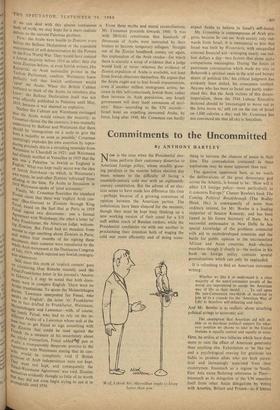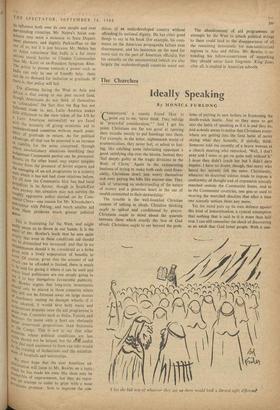Commitments to the Uncommitted
By ANTHONY HARTLEY
Now is the time when the Presidential elec- tions perform their customary disservice to American foreign policy, whose steadily grow- ing paralysis in the months before election day bears witness to the difficulty of facing a twentieth-century cold war with an eighteenth- century constitution. But the advent of an elec- tion seems to have made less difference this time —perhaps because of a growing consensus of opinion between the American parties. The isolationists have been silenced for the moment, though they must be kept busy thinking up a new working version of their creed for a US well within reach of Russian rockets, while the Presidential candidates vie with one another in proclaiming their intention both of waging the cold war more efficiently and of doing some-
thing to increase the chances of peace in their time. The contradiction contained in these aspirations may be more apparent than real.
The question uppermost here, as we watch the deliberations of the great democratic god across the Atlantic. is bound to be: 'How will it affect US foreign policy—more particularly as it concerns Europe?' Chester Bowles's book The Coming Political Breakthrough (The Bodley Head. 18s.) is consequently of more than ordinary interest, for Mr. Bowles is a leading supporter of Senator Kennedy, and has been tipped as his future Secretary of State. As a successful ambassador in New Delhi he has special knowledge of the problems connected with aid to underdeveloped countries and the battle for public opinion in the uncommitted African and Asian countries. And—election manifesto though it clearly is—the section in his book on foreign policy contains several generalisations which can only be applauded.
It is refreshing to find an American statesman writing:
Whether we like it or understand it, a clear majority of the non-Communist people of the world are unprepared to accept the American way of life as their model. . . . To call upon the non-Communist two-thirds of mankind to join us in a crusade for the 'American Way of Life' is therefore self-defeating and futile.
And Mr. Bowles is as realistic about attaching political strings to economic aid : The assumption that American aid will en-
able us to purchase political support for what- ever position we choose to take in the United
Nations is equally cynical and equally in error. Here, he strikes at two fallacies which have done more to ruin the effect of American generosity than anything else. Exhortation to 'be like me' and a psychological craving for gratitude are liable to produce allies who are both parasi- tical and increasingly separated from their countrymen. Inasmuch as a regime in South- East Asia earns flattering references in Time:— inasmuch as its delegation at the UN separates itself from other Asian delegations by voting with America, Britain and France—so it lessens
its influence both over its own people and over surrounding countries. Mr. Nehru's Asian con- science may seem a nuisance to State Depart- ment planners, and slightly Pecksniffian to the rest of us, but it is just because Mr. Nehru has an Asian conscience that India is a far more serious moral barrier to Chinese Communism than Mr. Kishi or ex-President Syngman Rhee. The policy to pursue towards a power such as India can only be one of friendly help: there Can be no demand for imitation or gratitude. If there is, that policy will fail.
The dilemma facing the West in Asia and Africa is that owing to our past record (and, though Americans do not think of themselves r'colonialists, the fact that the flag has not 0Wed trade in, say, Latin America makes little difference to the view taken of the US by a , Latin American nationalist) we are faced With the necessity of giving economic aid to underdeveloped countries without much possi- bilitY of gratitude in return. As for political (ivantage, all that can be expected is an increase in .stability for the areas concerned, through 1%101 revolutionary situations benefiting their 1,..ndigenous Communist parties can be prevented. ictissia, on the other hand, may expect tangible returns from the presence of Soviet experts and th! managing of an aid programme to a country Itb which it has not had close relations before. P. till now the Communist bloc has had local PAreludices in its favour, though in South-East a anyway this situation may not survive the ,.°LigIllY aggressive policy carried on by Com- 'Llnist China—one reason for Mr. Khrushchev's alnnoYance with Peking; and much smaller aid r°m them produces much greater political Rains.
This is frustrating for the West, and might
e4s11Y tempt us to throw in our hands. It is the Merit
of Mr. Bowles's book that he sees quite
clearly that even in these conditions aid should ne,)t be diminished but increased; and that in no !reumstances should it be considered as a bribe egiven with a lively expectation of benefits to Of course, given that the amount of aid t."Ich can be afforded is limited, there is much Ik\' be said for giving it where it can be used and u here local politicians are not simply going to mse it to buy them,selves favourable publicity. shr' 80wies argues that long-term investments th°uld only be placed in those countries where ofeV Will not be frittered away on large masses w Machinery rusting on decrepit wharfs; if it el,e adopted, it would save both waste and ilenrunnious disputes once the aid programme is ?Ander Way. Countries such as India. Tunisia and b ()rocco (to name only a few) are obviously oertter investment propositions than Indonesia the Congo. This is not to say that other st'untries where political conditions are less f able should not be helped; but the n'ret useful :erni that such assistance to them can take would iliethe training of technicians and the establish- It of hospitals and universities.
must hope that the next American ad- w,In.istration will listen to Mr. Bowles on a topic cb he has made his own. His ideas may be stn'c,ePtible of improvement, but they do repre- joi` an attempt to come to grips with a most 4'etable problem: how to improve the con- dition of an underdeveloped country without offending its national dignity. He has other good things to say in his book (for example, his com- ments on the American propaganda failure over disarmament, and his insistence on the need for more tact on the part of American officials), but his remarks on the uncommitted (which are also largely the underdeveloped) countries stand out. The abandonment of aid programmes or attempts by the West to attach political strings to them could lead to the disappearance of all the remaining democratic (or non-totalitarian) regimes in Asia and Africa. Mr. Bowles is re- minding his fellow-countrymen of something they should never have forgotten. King Lear, after all, is studied in American schools.



































 Previous page
Previous page